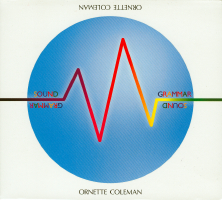- Sound Grammar
Infobox Album |
Name = Sound Grammar
Type = Live album
Artist =Ornette Coleman

Released = September 2006
Recorded =14 October 2005
Genre =Free jazz
Length = 56:11
Label = Sound Grammar
Producer = Ornette Coleman andMichaela Deiss
Reviews =
*Allmusic Rating|4|5 [http://www.allmusic.com/cg/amg.dll?p=amg&sql=10:70vsa9cgr23h link]
* Music Box Rating|4|5 [http://www.musicbox-online.com/reviews-2007/ornettecoleman-soundgrammar.html link]
Last album = "Three Women"
(1996)
This album = "Sound Grammar"
(2006)
Next album ="Sound Grammar" is an
album byjazz saxophonist andcomposer Ornette Coleman , recorded live inLudwigshafen ,Germany , on14 October 2005 . The album was produced byOrnette Coleman andMichaela Deiss , and released on Coleman's new Sound Grammar label. It is his first new album in almost a decade, since the end of his relationship with Verve in the 1990s. It features a mix of new and old originals (some of the latter given new titles).One unusual feature of the album that critics have frequently noted is Coleman's use of musical
quotation : his solo on the blues "Turnaround" includes snatches ofRichard Rodgers ' "If I Loved You" andStephen Foster 's "Beautiful Dreamer"; even more unexpectedly, the theme of "Sleep Talking" begins with the same notes as Stravinsky's "Rite of Spring ".The reception of the album has been highly positive; it figured at or near the top of virtually every jazz magazine poll at the end of 2006, including "Downbeat" and "Jazz Times".
In 2006, "Sound Grammar" received a Grammy nomination for Best Jazz Instrumental Performance. The following year, "Sound Grammar" won the 2007
Pulitzer Prize for Music .Track listing
# "Intro" - 1:14 (MC's spoken introduction)
# "Jordan" - 6:32
# "Sleep Talking" - 8:55 (a.k.a. "Sleep Talk" from "Of Human Feelings")
# "Turnaround" - 4:06 (a.k.a. "Turnabout" from "Tomorrow Is the Question! ")
# "Matador" - 5:57 (a.k.a. "Picolo Pesos" from "Sound Museum")
# "Waiting for You" - 6:50 (a.k.a. "House of Stained Glass" from "Colors")
# "Call to Duty" - 5:34 (has been performed live under the title "Crying Without Tears")
# "Once Only" - 9:40 (a.k.a. "If I only Knew as Much About You" from "Tone Dialing")
# "Song X" - 10:22 (from "Song X ")All compositions by Ornette Coleman.
Personnel
*
Ornette Coleman -alto saxophone ,violin ,trumpet
*Denardo Coleman - drums, percussion
* Gregory Cohen - bass
*Tony Falanga - bass
Wikimedia Foundation. 2010.
